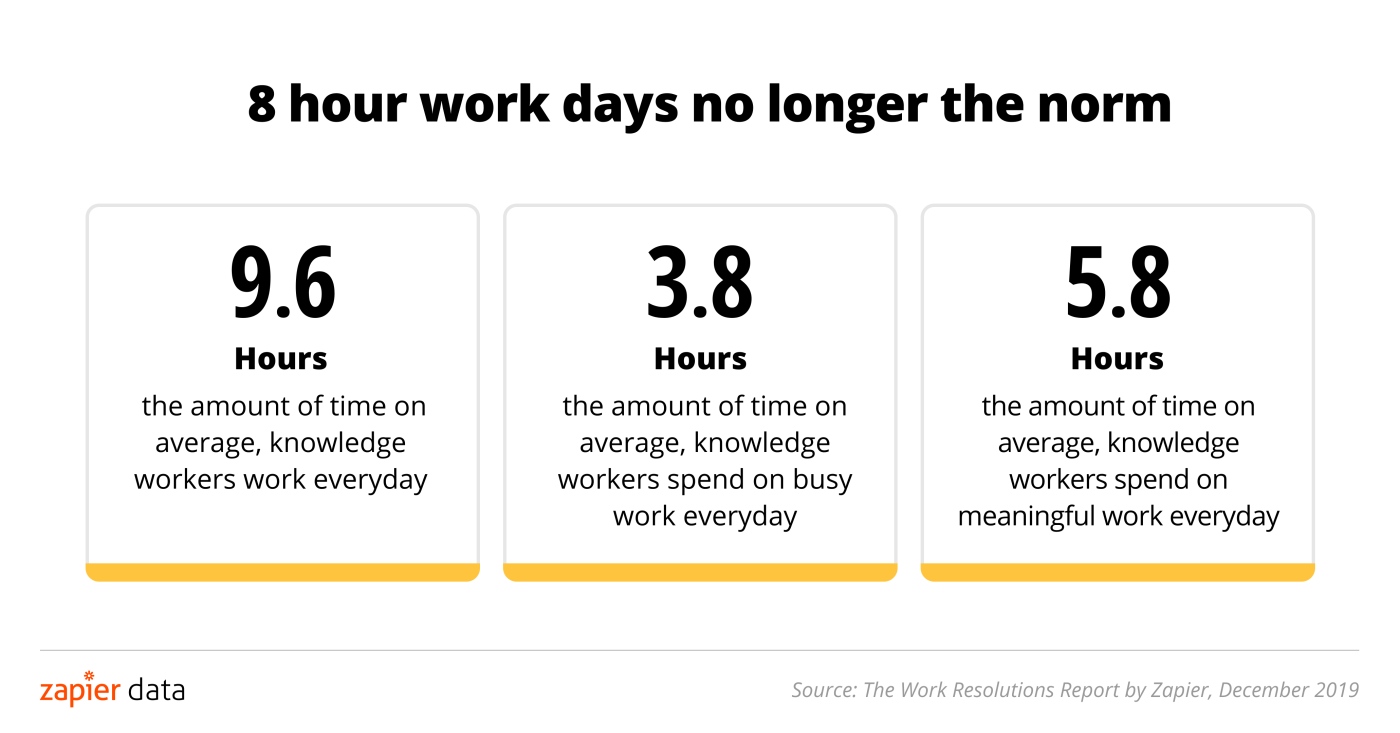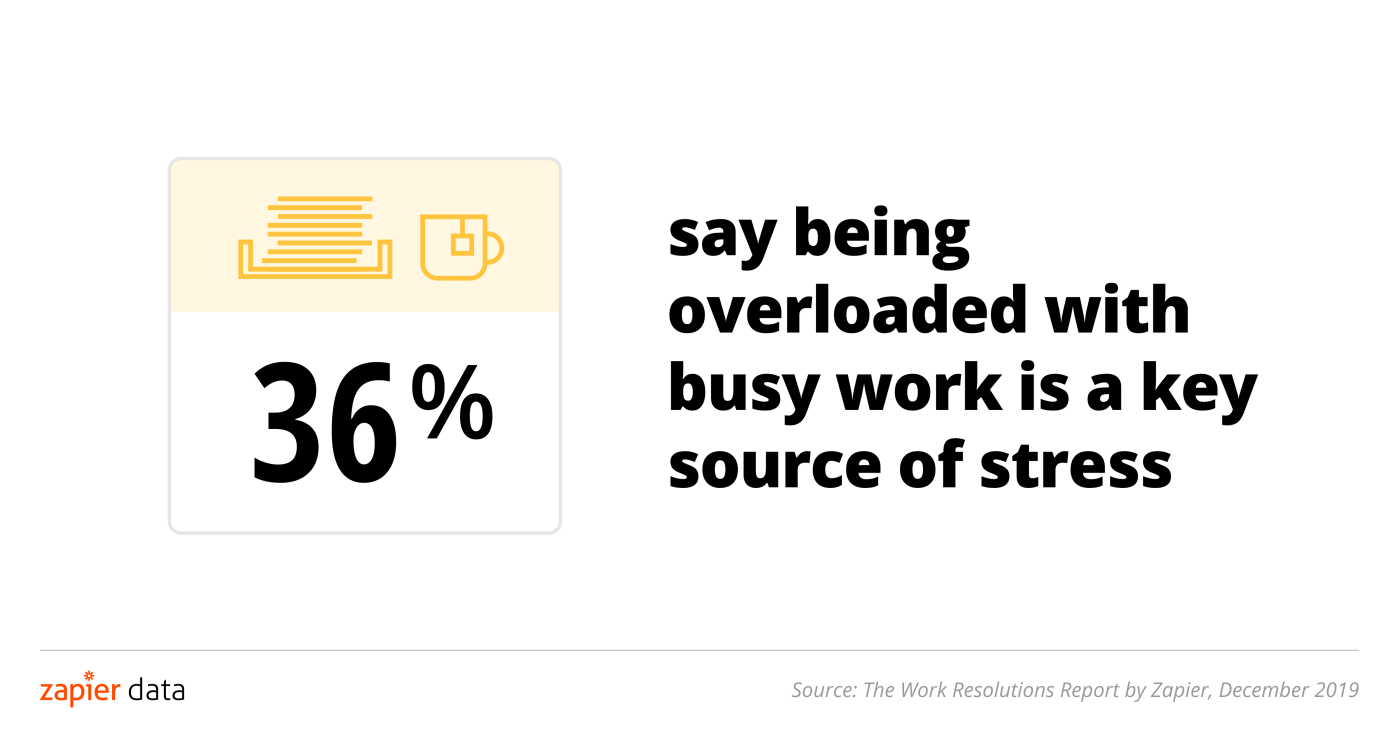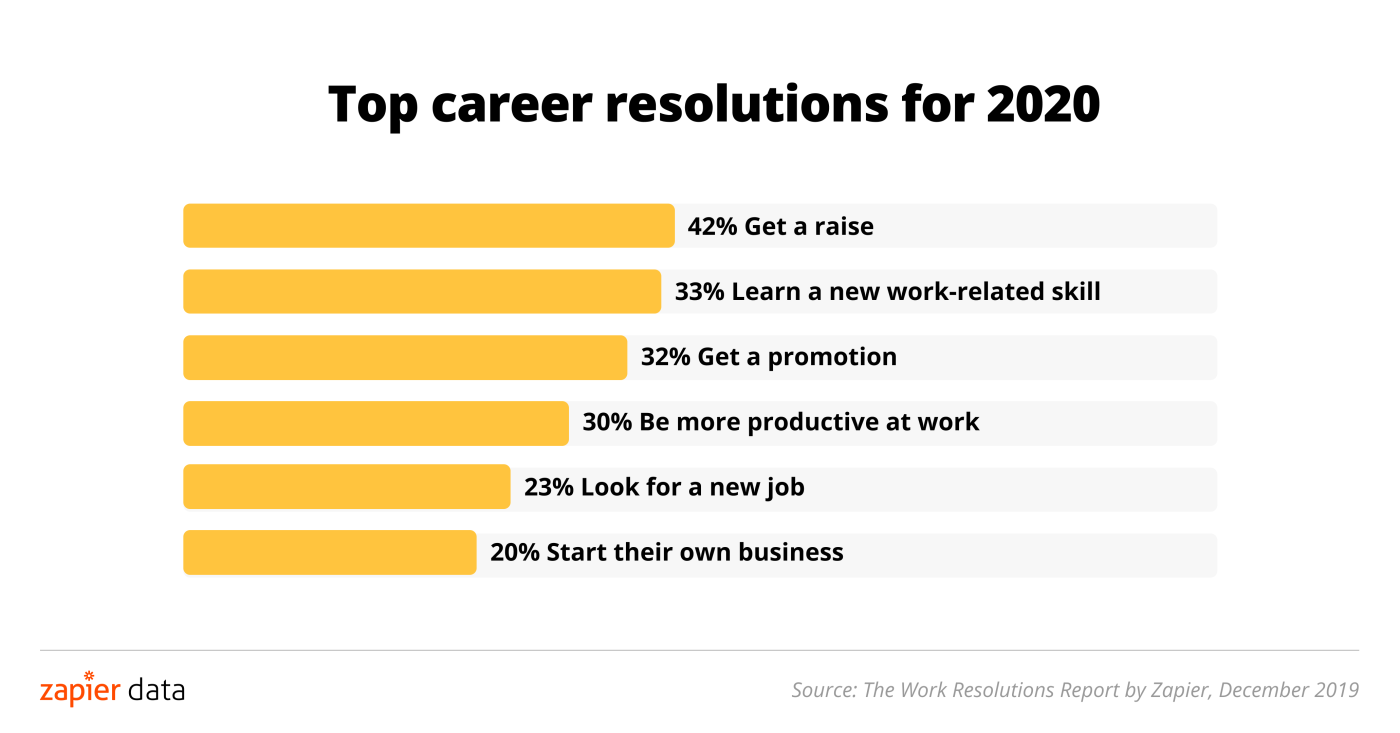2020 is almost here and knowledge workers are thinking about their New Years resolutions. We were interested in learning more about what they want to change about their careers, and the factors driving those changes—from stress to work-life imbalance.
So Zapier commissioned a survey, conducted online by The Harris Poll among over 880 U.S. knowledge workers (those who primarily work in a professional setting and use a computer as part of their job) to find out how people really feel about how they spend their weekdays, and what they resolve to do in the new year for their careers. The answers might surprise you.
About Zapier: Zapier helps more than 4 million customers grow their businesses with the power of automation by connecting over 1,500 apps. Founded in 2011, Zapier has always operated as an entirely remote company, and today has nearly 300 employees working in 27 countries around the world.
Nearly three-quarters of employed Americans (74 percent), and almost 9 in 10 employed college graduates (89%), are considered knowledge workers. Employed Millennials (ages 23-38) and Gen Xers (ages 39-54) are more likely to be knowledge workers than the older Baby Boomers (ages 55-73). Only 67 percent of employed Baby Boomers are knowledge workers, compared to 77 and 78 percent of employed Gen Xers and Millennials, respectively. Many knowledge workers (63 percent) supervise other employees.
As workdays get longer, workers are resolving to be more efficient
Knowledge workers are likely working almost 10 hours, on average, a day. Nearly four full hours of that are busywork.

Knowledge workers say they typically spend 5.8 hours, on average, doing meaningful work each workday and 3.8 hours, on average, doing busy work each workday.
This suggests that on average, knowledge workers are working 9.6 hours a day.
Despite this, knowledge workers feel it takes them 6.9 hours, on average, to effectively do their job in a typical workday based on how productive they are at work.
Nearly 1 in 3 (30 percent) say being more productive at work is one of their 2020 career resolutions
Cutting back on busywork could be the secret to reducing workplace stress
Workers are spending nearly four hours a day, on average, doing busy work – and it may be taking a toll on their stress levels.

Nearly 9 in 10 knowledge workers (87 percent) find parts of their job to be stressful. When broken down by generation, Millennial knowledge workers are more likely than their Gen X and Baby Boomer counterparts to find parts of their job stressful (94 percent vs. 86 percent and 77 percent.)
What is causing this stress?
Being overloaded with busy work — 36 percent
Unable to unplug from work — 31 percent
Dealing with a bad manager — 30 percent
Dealing with conflicts with coworkers — 27 percent
Not having enough paid time off — 25 percent
Their commute — 18 percent
Poor health benefits — 18 percent
Work-life balance is still a struggle
In addition to most knowledge workers being stressed about work, nearly three quarters (73 percent) say aspects of their life have been negatively impacted by their job.

Almost half of knowledge workers (46 percent) say their mental and/or physical health have been negatively impacted, while about 3 in 10 say their overall happiness (33 percent), personal relationships (31 percent), or hobbies (29 percent) have been negatively impacted by their job.
How might workers be dealing with this stress? Half of knowledge workers (50 percent) say they usually take a break during the workday to mentally refresh.
About 1 in 5 knowledge workers (19 percent) have taken a nap during the workday. Male knowledge workers are more than twice as likely as female knowledge workers to say they have taken a nap during the workday (24 percent vs. 11 percent)
Nearly 1 in 5 knowledge workers (19 percent) have lied in order to take a mental health day at work, suggesting that companies would benefit from broadening their time off policies to include mental health days.
Surprise! People want more money
Nearly 9 in 10 knowledge workers (88 percent) say they have 2020 career resolutions

Top resolutions include:
Get a raise — 42 percent
Learn a new work-related skill — 33 percent
Get a promotion — 32 percent
Be more productive at work — 30 percent
Look for a new job — 23 percent
Start their own business — 20 percent
Many knowledge workers are focusing on soft skill development
Critical thinking, leadership, top the list of skills that would make them the most eligible candidates. Programming is toward the bottom.
Nearly a quarter of knowledge workers (23%) say looking for a new job is one of their 2020 career resolutions. With that in mind, we asked knowledge workers what skills they believe would make them a top candidate for their dream job.

The skills that topped the list are:
Critical thinking — 53 percent
Leadership — 52 percent
People management — 51 percent
Time management — 49 percent
Communication — 48 percent
Innovation — 42 percent
Automation — 28 percent
Coding/ Programming — 16 percent
"Learning to code" isn't the popular resolution it used to be. Knowledge workers were 43% more likely to say automation skills make them a top candidate for their dream job over coding/programming skills — suggesting that tools that don't require coding skills ("No Code") are gaining ground.
Survey Method: This survey was conducted online within the United States by The Harris Poll on behalf of Zapier from October 25-29, 2019 among 1,180 employed U.S. adults ages 18 and older, among whom 886 primarily work in a professional setting and use a computer as part of their job. This online survey is not based on a probability sample and therefore no estimate of theoretical sampling error can be calculated.




